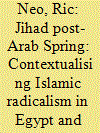|
|
|
Sort Order |
|
|
|
Items / Page
|
|
|
|
|
|
|
| Srl | Item |
| 1 |
ID:
170253


|
|
|
|
|
| Summary/Abstract |
This article examines the rise in jihadi activity within North Africa in recent years and aims to answer two fundamental questions: first, how have local and foreign jihadi groups capitalised on the unique domestic contexts in Tunisia and Egypt in the aftermath of the Arab Spring revolutions to advance their insurgencies? Next, what are the key factors conducive to extremism in both countries that have facilitated this? This study highlights the importance of contending with extremism with respect to the differentiated socio-historical, political and economic circumstances of each country. From a broader perspective, several trends common in the rise of extremism in both countries are identified. First, there is a tendency of extremism to consolidate in proportion to the amount of institutional void. Next, conditions of poverty often supply futile ground for the entrenchment of terrorism; in particular, the study highlights on how jihadi groups have made a concerted effort to damage the economic interests of each country. Finally, the presence of historical grievances provides a conducive environment for extremism. In light of the threat of cell dispersion following the recent defeats faced by ISIS in Syria and Iraq, an understanding of jihadi operations in North Africa becomes increasingly crucial.
|
|
|
|
|
|
|
|
|
|
|
|
|
|
|
|
| 2 |
ID:
197482


|
|
|
|
|
| Summary/Abstract |
This study investigates the effect of political misinformation as propaganda on the legitimacy of the Chinese government. A survey experiment (n = 2,236) was conducted to analyse the effect of positively spun misinformation on citizens’ perceptions and support for the government on two pivotal issues: the economy and air pollution. Results show that spreading positively spun misinformation is beneficial to the regime, as it leads to positive perceptions of the issue and increased support for the government. Interestingly, even when misinformation is exposed through credibly sourced corrections, trust and support for the government remain as high or higher than for the control groups. These effects are significant and hold constant in two issue types, underscoring the strategic value of disseminating positively spun yet false information in China. These findings have rich implications for studies of misinformation and fact-checking in general and China's information politics in particular.
|
|
|
|
|
|
|
|
|
|
|
|
|
|
|
|
| 3 |
ID:
190297


|
|
|
|
|
| Summary/Abstract |
Employing securitisation theory, this article critically evaluates political discourses in the United States involving US President Donald Trump. It makes two main arguments: first, present political discourses against Trump can be understood as part of a concerted securitisation process in which Trump’s presidency is constructed as a threat to US national security. The securitisation of an issue gives credence to the need for emergency measures to resolve a purported threat; within this context, the process aims to justify measures including the emergency impeachment of the President. Next, using primary data gathered from an online questionnaire (n = 529) and secondary data from polling agencies, this article demonstrates that there had been popular resonance and acceptance of the securitisation discourse, that sufficient institutional support for impeachment was generated and that there was low coherence of counter-narratives opposed to the securitisation. This article highlights how securitisation can be undertaken over a protracted span of time through both discourses and practices, and in concert by a slew of actors rather than being carried out by a single lead actor. Importantly, it suggests that analysing audience responses to an unfolding securitising move can generate valuable insights about the securitisation processes and its potential outcomes.
|
|
|
|
|
|
|
|
|
|
|
|
|
|
|
|
| 4 |
ID:
186994


|
|
|
|
|
| Summary/Abstract |
The Chinese government is fond of invoking the ‘hurt feelings of 1.4 billion Chinese citizens’ to protest foreign actions and policies. However, this rhetoric might be nothing more than propaganda and attempts to leverage nationalist sentiment. How much do citizens in China actually care about issues completely unrelated to their daily livelihoods? To answer this, the study employs a representative survey to investigate the extent to which rhetoric about ‘hurt feelings’ is consistent with public opinion on four contemporary socio-political disputes involving the NBA, Marriott International, Mercedes-Benz and the city of Prague. Across the scenarios, we found that the Chinese government did not exaggerate the displeasure of audiences—citizens are aware of the cases, were indeed upset by them and advocated for retaliatory measures that were surprisingly more forceful than those adopted in reality. These emotions were largely driven by nationalistic sentiment rather than personal experiences or encounters, suggesting the success of state propaganda in steering the public opinion toward outcomes favourable to the state. These findings support recent studies highlighting the peculiar case of rising nationalism in China, and have important implications for the impact of public opinion on Chinese policymaking.
|
|
|
|
|
|
|
|
|
|
|
|
|
|
|
|
|
|
|
|
|